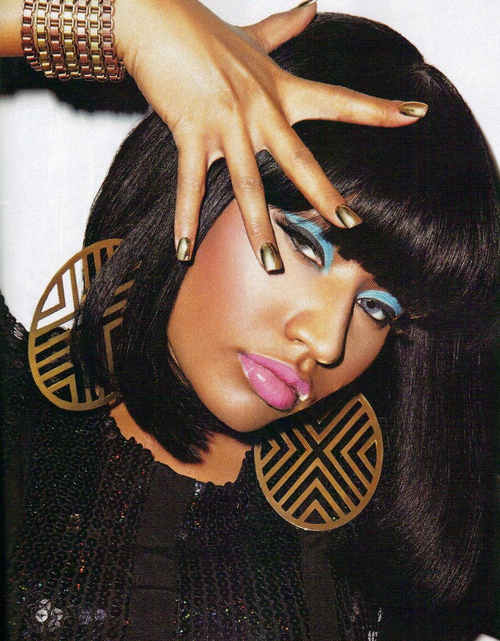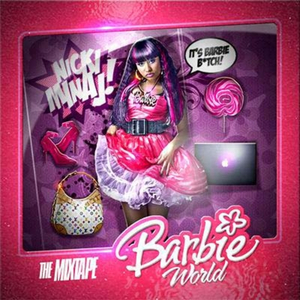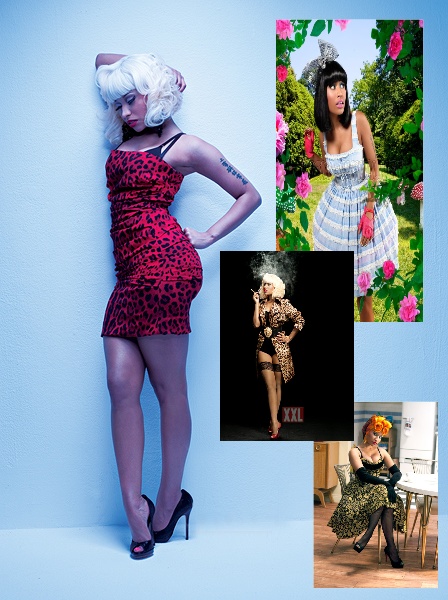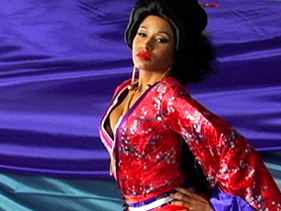 As BET gets set to air its documentary about women and hip hop Monday, I am finding my 30-plus, old school feminist-self working hard to gear up to get down with the over-the-top, lyrically layered, brand savvy rapper that is Nicki Minaj.
As BET gets set to air its documentary about women and hip hop Monday, I am finding my 30-plus, old school feminist-self working hard to gear up to get down with the over-the-top, lyrically layered, brand savvy rapper that is Nicki Minaj.
The self-described Barbie is inescapable. She works every rap and R&B hook, and changes her looks to fashion what could be categorized as camp, cultural appropriation or classic sexual objectification. Until Minaj, I’ve managed to safely maneuver around mainstream new millennium starlets because they offered no more than a cookie-cutter replica of the unique hip hop dynamism I remembered. (See the links to artists below.) Likened to Lady Gaga for her eye-catching performances, this former theater student is adept at staging media spectacles, such as autographing breasts, adopting different voices, and orchestrating a coming-out tweet to squash rumors about her bisexuality for those who might have misread the Remy Ma viral video confession from her masculine persona, Roman, as Nicki Minaj. You can call the latter a cop-out or a capitulation to a commercial model that demands that all women perform hyperfemininity period. As I enter Nicki’s world (slowly and with caution), I am not only considering the ways she uses her body, but I am thinking of three ways her performances of race, gender and sexuality instigate a feminist engagement with the popular.
 1. Beauty and Postfeminism
1. Beauty and Postfeminism
Postfeminism advertises the sexy, smart, economically successful self-absorbed it-girl from a post-patriarchal world where politics are defined by “style wars” rather than issues of gender inequity. Here, beauty and postfeminism seem to be disconnected from critiques of consumerism, gendered labor, or political citizenship. On the one hand, the look-good-feel-fine empowerment that Minaj offers feels as lifeless as the dolls she suggests every girl wants to be—you know, the nonspeaking, decorative, plastic bodies to be handled and watched. Then again, I can imagine her Barbie thang as her way of injecting a sense of beauty and wonderment for homegirls, like herself, who’ve had to create other worlds to escape the ugly one they lived every day. In either case, Minaj has managed to capture the attention of young women—hook, line and stiletto.
 2. The Lady and The Freak
2. The Lady and The Freak
In what could be described as a post-Tip Drill moment where folks are “manning” the line to distinguish the ladies from the freaks, Nicki Minaj is not the only one who is creating personas to perform otherness. As Roman Zolanski she can express desire for another woman, and as Harajuku Barbie she can perform a sexualized Asian girlhood without damaging the central “brand” or image. Beyoncé is another celebrity with a freak persona. In big hair and tall heels, Sasha Fierce does Beyoncé’s “dirty work.” Both entertainers talk about a sense of freedom—which is almost always connected to sexual freedom. Celebrity aside, ordinary young women on and off screen are crafting “real” and alternate/virtual identities as a response to the increased policing of their bodies through this hip hop binary. Rather than marking public/private bodies, young women like Minaj are now describing their “real” good bodies and their fake freakish ones. In our sincere efforts to “free the girls,” it is possible we might have caged our “real” sexual selves.
 3. Camp, Celebration or Cultural Appropriation
3. Camp, Celebration or Cultural Appropriation
From her Anime-inspired Vibe magazine cover, her Harajuku Barbie persona, to her recent music video, Your Love, where she plays a geisha girl (among others), Minaj reprises dated stereotypes about Asian women that suggest desirability comes in part from submissiveness or obedience. Costuming conceals and reveals her body, and both frame her as the exotic; the hand gestures she does in separate scenes either to seduce her lover or to fight her foe are grafted from other forms of popular culture depicting Asianness. I can remember the debut of the Harajuku Girls shadowing Gwen Stefani at a music awards show. Then, folks flipped about a white woman co-opting Asian culture and parading other women (as objects of her imagination). Yet, as Minaj mines the visual landscape to reinvent herself, her Afroasian encounters – whether camp, celebration, or cultural appropriation – remain unchallenged.













Esha, this piece is deep, thought-provoking and multi-layered and I’m going to have to sit with it and digest it and respond more later. I did want to ask though if you saw the Nicki Minaj interview in the June/July Vibe (I think you referenced it above.) I was floored by her assertion that she “doesn’t date or have sex with women” since her alleged bi-identification has been one of the key identity markers that cause folks, especially my students, to read her presence as radically subversive . So why is she walking back the claims on her sexuality? Identifying as bi certainly hasn’t seemed to hurt her career. Just curious.
Thanks for the early response. I do think her “performance” of bisexuality is part-and-parcel of the way she has chosen to reinvent herself. Trust, it *is* as problematic as her racial performances where she adopts damning sexual scripts about Asian womanhood. In both cases, a kind of racialized sexuality serves as profitable commodity (much like the doll she proclaims to be) for public consumption. If she is supposed to be the fresh female face of popular hip hop culture, I think — as others have mentioned — we gotta talk about what’s happening. In separate interviews, she talks about having the Lil Kim image as “the” representation of women in hip hop. Her sentiments are echoed by so many young women (just a few years young than us) who grew up with different models and modalities of gender and sexual expression. As much as I have tried to dismiss the entertainer (that I imagined as Lil Kim v 2.0), I think she opens up the kind of transgenerational discussions that I welcome with other folks who dig her, who hate her, or who have no frame of reference to compare because they don’t know about many of the overlooked artists we list right here on the site.
Peace,Esha
snap, this is so helpful–first of all I have really disengaged from mainstream music b/c it drives me crazy, literally, that crazy feeling like oh my god, am i the only one who thinks this is so fucked up? I like crunktastic have to sit on this, but will share with other women and dialogue about this. a million blessings to you for bringing this out and sharing. thank you.
Thanks for reading the post. You are right about mainstream music. I feel you. I *have* to remain engaged with popular culture because it’s what girls and young women are consuming. I really don’t know Minaj the way my niece might know her, but I know if I want to have a meaningful conversation about feminism, beauty, sexuality, etc., I have to try to understand her world and that of other young women. It takes work. I have a newfound appreciation for my feminist mentors who didn’t want to have anything to do with hip hop culture, but they were willing to listen to me and other young women from the hip hop generation who began voicing our brand of feminism.
SO this was an excellent post, but I do want to point out that there is an assumption that Nicki is a “black girl”. Nicki may identify as one but we need to be aware that she is multi-racial and part Asian herself. That isn’t to say that she is not perpetuating gendered Asian stereotypes or participating in the commodification of Asian culture, but knowledge of her multi-ethnicity makes her comparison to Gwen Stefani non applicable.
Although she is not Japanese, sooo… yeah 🙂
Thanks for response. Yes, indeed Nicki is multiethnic. I was aware of her background when I wrote the piece. Her racial and ethnic identity is interpreted from a different context in Trinidad (where she is from) where there are more fluid ways of thinking about racial and ethnic identity. Just because she is “read” as black does not close off that we cannot talk about her racial performances. This is why is it always important to talk about performance and representation–and both hold no guarantees. I think it is important for people of color to be mindful of the ways we also “try on” other people’s culture. When Outcast performed on the awards displaying symbols from Native American culture for sheer entertainment value, for example, it was deeply disturbing to me. You’re right in saying Minaj and Stefani might not be the same because of social location, but Asian (Japanese specifically) invisibility is still there. How might we begin to talk about forms of cultural appropriation and stereotypes that communities of color produce about each other?
Dope post.
I would like to comment on Hip Hop, emcees, and talent as that pertains to mainstream music and women. I started off as an almost-supporter of Nicki Minaj based on her talent (back then she was spittin’ about hooking up with women and playing men to the left). Then it seemed that as her star began to rise, her talent/work ethic (as far as emceeing is concerned) quickly declined. She began to rely more and more on selling sexualized imagery, submissiveness to men, and appealing to children and teens as a way to ride her wave. I also bear in mind that she is not autonomous in her representation of herself and that the brand that is “Nicki Minaj” was created my men.
I’m quite annoyed at the mainstream attention given to her as if she has done or created something new. She has re-invented images that were created by Li’ Kim and Foxy Brown, but she doesn’t even spit like they can! There is something to be said about that. As the Hip Hop community, it seems that we have turned our heads and lowered our eyes to this fact. The woman doesn’t even think she has to try (who else besides her lip-synced on the BET awards? [not that I watched]). This is a very destructive message to send to young girls and women: you don’t have to try hard if you’re pretty.
Basically, as a Hip Hop head, a lover of all things woman, and an overall stayin-woke individual, I hereby declare the Nicki Minaj brand disgraceful and detrimental to Hip Hop, the black community at large, and the psyches of young girls and women everywhere.
The only thing I could do to cope with the nasty taste in my mouth regarding how young girls will think about women who emcee is put my little sister on to Jean Grey. Shame on VIBE (you don’t see Nicki Minaj on the cover of waxpoetics mag! Neither was Jean Grey, but she had a dope article in that joint!) This tower must/will fall.
ugh.
E.
E. You are so right! I co-sign everything that you are saying. Your spot-on critique is one of the main reasons why we have to engage with the mainstream, lest all of those things you’ve pointed out (e.g., male sponsor, sexualization) will go unchecked. We gotta engage with the mainstream so that girls and young women will not think Minaj is *the* representation of women in hip hop. We all need to be like you and share artists who can offer us another way of looking at ourselves and the world. Thanks for your reply. E.